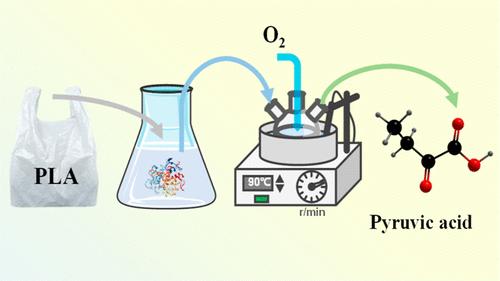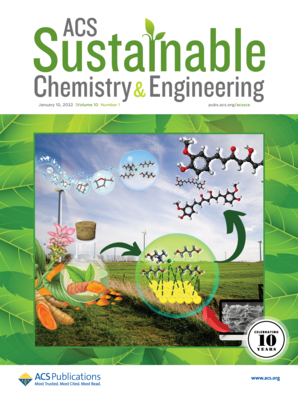One-Step Synthesis of PtPb Alloy Nanoparticles Via Wet Chemical Method for the Upgraded Recycling of PLA Plastic
IF 7.1
1区 化学
Q1 CHEMISTRY, MULTIDISCIPLINARY
引用次数: 0
Abstract
Biodegradable plastics such as polylactic acid (PLA) have been extensively applied in numerous fields. Although PLA is degradable in natural environments, its decomposition postdisposal leads to resource wastage. Herein, we first employ enzymatic hydrolysis to degrade PLA. Subsequently, PtPb alloy nanoparticles are synthesized in a single step via a wet chemical method, catalyzing the reformation of the PLA enzymatic hydrolysis products into higher-value chemicals (pyruvic acid). Under conditions of an oxygen flow rate of 60 mL/min, a reaction temperature of 90 °C, and a reaction duration of 60 min, the conversion rate of lactic acid catalytic oxidative dehydrogenation to pyruvic acid reaches an impressive 96.86%, with a selectivity of 95.69%. Moreover, this catalyst exhibits satisfactory stability. Experimental and density functional theory (DFT) calculations are combined to ascertain the active state changes of PtPb and the reaction pathways for the catalytic oxidative dehydrogenation of lactic acid to pyruvic acid, as well as the free energy changes of different catalysts in this transformation. In this work, we employ a simple synthetic strategy to specifically investigate the impact of PtPb alloy nanoparticles under various conditions on the catalytic oxidative dehydrogenation of lactic acid to pyruvic acid, offering a new research avenue for the waste treatment and resource utilization of biodegradable plastics in the future.

湿化学法一步合成PtPb合金纳米颗粒用于PLA塑料的升级回收
生物降解塑料如聚乳酸(PLA)在许多领域得到了广泛的应用。虽然聚乳酸在自然环境中是可降解的,但其分解后处理导致资源浪费。在这里,我们首先采用酶水解来降解PLA。随后,通过湿化学方法一步合成了PtPb合金纳米颗粒,催化PLA酶解产物重组为高价值化学品(丙酮酸)。在氧气流量为60 mL/min、反应温度为90℃、反应时间为60 min的条件下,乳酸催化氧化脱氢制丙酮酸的转化率达到96.86%,选择性为95.69%。此外,该催化剂还表现出令人满意的稳定性。结合实验和密度泛函理论(DFT)计算,确定了PtPb的活性态变化和乳酸氧化脱氢制丙酮酸的催化反应途径,以及不同催化剂在这一转化过程中的自由能变化。本研究采用简单的合成策略,具体研究了不同条件下PtPb合金纳米颗粒对乳酸氧化脱氢催化制丙酮酸的影响,为今后生物降解塑料的废弃物处理和资源利用提供了新的研究途径。
本文章由计算机程序翻译,如有差异,请以英文原文为准。
求助全文
约1分钟内获得全文
求助全文
来源期刊

ACS Sustainable Chemistry & Engineering
CHEMISTRY, MULTIDISCIPLINARY-ENGINEERING, CHEMICAL
CiteScore
13.80
自引率
4.80%
发文量
1470
审稿时长
1.7 months
期刊介绍:
ACS Sustainable Chemistry & Engineering is a prestigious weekly peer-reviewed scientific journal published by the American Chemical Society. Dedicated to advancing the principles of green chemistry and green engineering, it covers a wide array of research topics including green chemistry, green engineering, biomass, alternative energy, and life cycle assessment.
The journal welcomes submissions in various formats, including Letters, Articles, Features, and Perspectives (Reviews), that address the challenges of sustainability in the chemical enterprise and contribute to the advancement of sustainable practices. Join us in shaping the future of sustainable chemistry and engineering.
文献相关原料
公司名称
产品信息
阿拉丁
Protease K
阿拉丁
Ascorbic acid (AA, ≥99%)
阿拉丁
Oleylamine (OAm, 70%)
阿拉丁
Platinum acetylacetonate [Pt(acac)2, 97%]
阿拉丁
Lead acetylacetonate [Pb(acac)2, 95%]
阿拉丁
Sodium hydroxide (NaOH, 96%)
阿拉丁
Pyruvic acid (PyA, 98%)
阿拉丁
Lactic acid (LA, 80%)
阿拉丁
Lactic acid
阿拉丁
Protease K
阿拉丁
Ascorbic acid (AA, ≥99%)
阿拉丁
Oleylamine (OAm, 70%)
阿拉丁
Platinum acetylacetonate [Pt(acac)2, 97%]
阿拉丁
Lead acetylacetonate [Pb(acac)2, 95%]
阿拉丁
Sodium hydroxide (NaOH, 96%)
阿拉丁
Pyruvic acid (PyA, 98%)
阿拉丁
Lactic acid (LA, 80%)
阿拉丁
Lactic acid (LA, 80%)
 求助内容:
求助内容: 应助结果提醒方式:
应助结果提醒方式:


